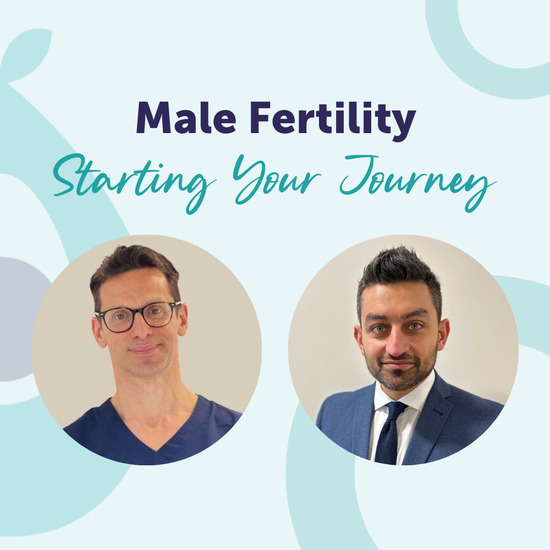
In around 50% of all infertility cases, the inability to conceive can be attributed to male-factor infertility. Male fertility issues, just like their female counterpart, are common – but the impact of male reproductive health on those attempting to conceive is discussed to a lesser extent.
Firstly, it is vital to understand the scope of male reproductive health concerns, as common complaints range from erectile dysfunction to sperm disorders, caused by anything from lifestyle factors to medical conditions inherited from your parents; it can be challenging to identify the root cause of an issue without proper investigation.
The good news is, no matter the concern, options are available to help you receive a diagnosis and conceive when you’re ready. We caught up with our Consultant Urological Surgeon and Andrologist, Mr Steve Bromage, about male reproductive health concerns and their common causes, symptoms to be aware of and when it may be time to see a specialist at Manchester Fertility.

Common male reproductive health concerns and their causes:
Low Sperm Count: The NHS categorises a typical sperm count as anything above 15 million sperm per millilitre of semen. Those with a low sperm count have less sperm in their semen than this average. A low sperm count is also known as oligospermia. Oligospermia is different to a complete lack of sperm in your semen, also known as azoospermia.
A low sperm count can decrease the chance of you and your partner getting pregnant naturally. It may be an isolated issue or be part of another disorder which may have other symptoms, such as:
- Problems with sexual function – such as low sex drive or difficulty maintaining an erection
- Pain, swelling or a lump in your testicles or the surrounding area
- Decrease in body or facial hair
Rest assured, having a low sperm count doesn’t mean you and your partner won’t be able to get pregnant naturally. In fact, many patients do go on to conceive a child without assistance.
If you are diagnosed with oligospermia or azoospermia, there are methods to overcome these conditions ranging from changes to your lifestyle to increase your sperm count naturally or surgical options to retrieve sperm cells directly from the testicles, like a Surgical Sperm Retrieval, so it can be used in treatments like IVF or ICSI.
Poor Sperm Quality: When analysing a patient’s semen, we take into account not only the concentration of sperm in the sample – but the morphology, or shape of the sperm and motility, and how well they move. Sperm shape is essential to the ability of the sperm to move or swim. Therefore, it’s not uncommon for poor sperm morphology to go along with poor sperm movement. In some cases, your sperm count may be considered normal, but the quality of your sperm may make it difficult to conceive naturally.
If your sperm is of poor quality or has poor motility, there are several possible causes; these can include lifestyle factors – like drinking too much alcohol, smoking heavily or poor nutrition. Certain medications, like chemotherapy, will result in poor quality and lower amounts of sperm, as will exposure to certain chemicals if you handle them at work.
It’s important to remember that just like a low sperm count, having poor-quality sperm does not mean you cannot conceive. In some cases, lifestyle changes may help improve the quality of your sperm. In others, IVF and ICSI can be effective ways for you to start your family.
Erectile Dysfunction or Ejaculation Disorders: Erectile dysfunction is the inability to get and maintain an erection. Although having trouble occasionally isn’t necessarily a cause for concern, if you find the issue persists, you may want to seek help.
Erectile dysfunction, and other disorders that could impact your ability to conceive naturally, can cause stress and take a toll on your self-confidence. However, even if you’re embarrassed, it’s important that you speak to a doctor if you see the obvious signs of persistent erectile dysfunction or ejaculation disorder.
In some cases, an underlying condition may be contributing to your condition. In other cases, medications or other direct treatments might be needed.
Occasionally having erection trouble getting or maintaining an erection isn't necessarily a cause for concern. If erectile dysfunction is an ongoing issue, however, it can cause stress, affect your self-confidence and contribute to relationship problems. Problems getting or keeping an erection can also indicate an underlying health condition that needs treatment and a risk factor for heart disease.
If you're concerned about erectile dysfunction, talk to your doctor — even if you're embarrassed. Sometimes, treating an underlying condition is enough to reverse erectile dysfunction. In other cases, medications or other direct treatments might be needed to help you start your family. No matter your circumstance, our Male Reproductive Health Consultants are experts in their field and will be able to provide you with the guidance you need.
Genetic Factors:There are a number of hereditary genetic conditions that may impact your sperm quality, quantity or general sexual health. Conditions including cystic fibrosis, Y-chromosome microdeletions, and Klinefelter syndrome can all contribute to abnormal sperm health and cause male factor infertility. For conditions like these, it’s unlikely that lifestyle changes will have a significant impact in helping you conceive naturally.
However, even for those with a hereditary condition, treatments like ICSI, where a single healthy sperm is injected into an egg to aid in fertilisation, may be viable routes for starting a family. For some men, treatment with donor sperm may also be discussed.
Structural Issues: The human body is complex. Factors like illness or injury can affect its ability to do its job correctly. The system for producing and delivering sperm requires input from all over your body, from the brain all the way down to your reproductive organs. But structural issues could still stop you from conceiving, even if you’re otherwise in great shape.
Infections, surgeries and genetic diseases can all lead to obstructions that halt the production or delivery of healthy sperm. Even accidents that damage the penis or testicles can affect your body’s ability to conceive.
Some men, and those assigned male at birth, are born with blocked ducts or tubes. In others, conditions like hypospadias, urethral openings on the underside of the penis, can lead to poor sperm delivery.
In many of these cases, such as with a genetic condition or with injury, the structural issue cannot be prevented – but that does not mean it cannot be combated to help you create your family.
What is a Male Fertility Review?
Among the common reasons you may be struggling to conceive include low sperm count, poor sperm quality, genetic factors and structural issues. There are a multitude of other male reproductive health concerns that could be affecting your fertility.
If you’re concerned about your reproductive health and would like more insight, start your journey with a Male Fertility Review today. A male fertility review at Manchester Fertility is a comprehensive assessment and analysis of a man's (or those assigned male at birth) reproductive health.
Including a semen analysis, a testicular ultrasound, hormone blood tests, a health check and a private consultation with a Male Reproductive Health Consultant, a Male Fertility Review will help our team identify any concerns and bring you one step closer to creating your family.
If you have any questions about treatment or would like more information on our male reproductive health offering, our friendly patient team are here to help you at 0161 300 2737. Or, if you are ready to start your fertility journey with us, you can book a free 1-2-1 discovery appointment – our New Patient Coordinators will give you all the information you’ll need to get started.
Last updated: 18th July 2023








